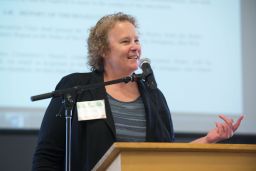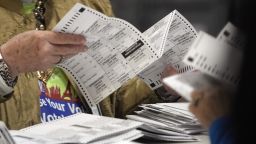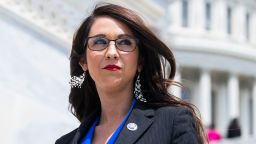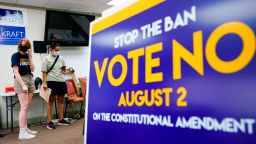Editor’s Note: Sheila Leslie, a long-term Nevada resident, served as a Democrat in the Nevada state legislature for 14 years. She is a columnist for the Reno Gazette-Journal and a retired human services professional. The views expressed in this commentary are her own. Read more opinion on CNN.
Of all the Senate Democrats said to be at risk of being engulfed by a Republican “red wave,” Sen. Catherine Cortez Masto was widely viewed as the most vulnerable. And yet as we all now know, the incumbent senator from Nevada now will serve another six years, after being declared the projected winner this weekend over her Republican challenger.
Cortez Masto’s crucial win, which doubters had insisted was unlikely at best, clinched Democratic control of the Senate for the second half of Joe Biden’s presidency.

When the last large batch of ballot results were released from Democrat-leaning Clark County late Saturday, Cortez Masto took a decisive lead over her election-denying Republican challenger Adam Laxalt. And when she was pronounced the winner, progressives breathed a long sigh of relief. We’ve been waiting for years for the country to regain its sanity and repudiate the lies and misinformation from Trump and his acolytes.
The full story has yet to be written about how she was able to wrest victory from Laxalt, but if you look at the vote percentages coming in for Cortez Masto from rural Nevada over the last few days, they are surprisingly high given the overwhelming Republican registration there. Those critically important rural votes, added to the urban vote, pushed her over the top.
Simply put, Cortez Masto was able to siphon away just enough votes from Laxalt, former President Donald Trump’s 2020 Nevada campaign co-chair, by making forays into the MAGA-leaning, rural parts of her state, padding her wins in urban strongholds like Reno and Las Vegas.
Nevadans are still adjusting to Covid-era election reforms that provide many early voting opportunities, universal mail-in ballots, drop-off boxes and same-day registration. Since much of the mail is counted in the days after the election, Republicans running statewide often see their leads slowly evaporate. It’s expected and explainable, although that doesn’t always stop MAGA Republicans from irresponsibly claiming election fraud when they lose.
Cortez Masto campaigned vigorously throughout the Silver State, running a textbook campaign, even earning endorsements from high-profile Republicans throughout the state who praised her bipartisan leadership, work ethic and integrity. This was in contrast to Laxalt, who many viewed as a carpet-bagging Virginian, capitalizing on his grandfather’s sterling reputation in the state.
(Adam Laxalt’s grandfather Paul Laxalt was a beloved former governor and US senator from Nevada, whose family emigrated from the Basque country in the 1920s to raise sheep in the high desert of Northern Nevada.)
Aside from her outreach to moderate Republicans, Cortez Masto followed a tried-and-true campaign playbook, making fulsome use of the Nevada Democratic establishment’s vaunted get-out-the-vote ground game, honed and perfected by the late Harry Reid, the former Democratic Senate Majority Leader.
That ground game was bolstered by the influential Culinary Union members who reportedly knocked on over a million doors in a coordinated push to get Cortez Masto across the finish line. She also leaned in on abortion rights, an issue of great interest to voters across the political spectrum.
The senator received ample support from a variety of progressive advocacy organizations and individual backers, including hundreds of volunteers from California, who streamed into Nevada, where their time and talents are more politically productive, to provide election help.
And the week before the election, Third Act, a new national group targeting people over 60 to work on climate justice and protecting democracy, sent its celebrity founder, climate activist Bill McKibben to Nevada to meet with hundreds of older Nevadans. He was joined by renowned author Rebecca Solnit and Secretary of State candidate Cisco Aguilar at a “Defend Our Democracy” event in Reno.
That event inspired scores to show up the next day to walk door-to-door for pro-democracy candidates, shining a bright spotlight on Aguilar who subsequently won a close race against a staunch election-denier, Jim Marchant. He had vowed to “overhaul the fraudulent election system” in Nevada.
Marchant had a hand in organizing a false slate of “alternative” electors that was sent to Congress after the 2020 election. He indicated he would not have certified the vote in 2020 – and officials in Nevada fear he might not observe the election norms in 2024 if Trump is the Republican party’s presidential nominee.
The Reid machine and grassroots efforts were not as successful for Gov. Steve Sisolak however. He was denied a second term by Sheriff Joe Lombardo, a Trump-endorsed candidate who was forced to dial back his characterization of Trump in a debate as merely a “sound president.”
When the former president expressed grumpy displeasure at the comment, Lombardo proclaimed him “the greatest president” a few days later. Lombardo looked weak and beholden to Trump, but he pacified the MAGA crowd and maintained their support.
Many factors played into Sisolak’s defeat, some of them outside his control, including the global pandemic, which devastated Nevada’s tourism industry for months. Sisolak, to his credit, prioritized public health measures and saving lives while absorbing anger and resentment from Nevadans who valued their mask-avoiding liberty over protecting their neighbors.
In coordination with casino executives, he closed the Las Vegas strip for months, overwhelming the state’s unemployment system, which couldn’t keep up with the number of people suddenly unable to work.
Sisolak’s reelection bid suffered from other challenges: He alienated progressives with vetoes of several key Democratic policy bills, including a death penalty abolition bill that certainly won’t resurface under Lombardo’s administration. Progressives likely still voted for him, but with little enthusiasm – complaining about his lack of vision and inaction on many priority concerns. Some undoubtedly chose the unique Nevada option of “none of the above” on their ballots, in a protest against both candidates.
But aside from Sisolak being given a pink slip, it was a good election for Nevada’s Democrats. They kept their three congressional seats and added to their majorities in the state assembly and state senate, majorities which mean that they can limit any drastic budgetary or policy measures Lombardo may want to enact.
And, importantly, they kept an election-denier out of the all-important post of secretary of state. In previous election years, that race would have been of back burner interest. But this year, flipping the seat into Democratic hands and away from meddling of the Republican challenger – QAnon-linked Marchant – was a top priority for many Democratic voters.
The governor-elect will now get an opportunity to wrestle a severely underfunded state government into shape. He may be in for a shock when he discovers just how woefully underpaid the state workforce is and its astronomical vacancy rates.
Now Nevadans will have to wait to see how Lombardo makes good on his promise to boost the economy by reducing regulations (as if that is what ails the state.) There’s a good reason why Nevada’s Republican governors never make good on their tired promises to cut taxes and ‘waste’ in state government. Lombardo is about to find out.
If our newly-elected governor absorbs the national message of this election cycle, he’ll approach his new job with a post-MAGA attitude and get to work with the Democratic legislature on the many pressing issues facing Nevadans.
Voters have shown us they’re exhausted by the political chaos and lack of civility. They want problem solvers, not flame throwers. With its mixed election results, Nevada may lead the way back to a democratic norm that we worried we might not see again.



